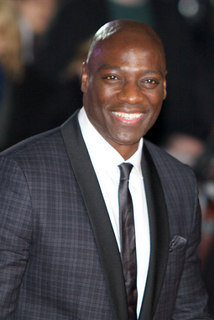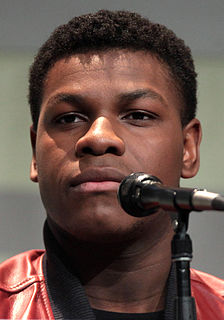A Quote by Adewale Akinnuoye-Agbaje
I'm of Nigerian descent, from the Yoruba tribe. Names are very significant in that culture. It basically states your purpose in life.
Related Quotes
Oh, I love labels, as long as they are numerous. I'm an American writer. I'm a Nigerian writer. I'm a Nigerian American writer. I'm an African writer. I'm a Yoruba writer. I'm an African American writer. I'm a writer who's been strongly influenced by European precedents. I'm a writer who feels very close to literary practice in India - which I go to quite often - and to writers over there.
If you don’t know your purpose, discover it, now. The core of your life is your purpose. Everything in your life, from your diet to your career, must be aligned with your purpose if you are to act with coherence and integrity in the world. If you know your purpose, your deepest desire, then the secret of success is to discipline your life so that you support your deepest purpose and minimize distractions and detours.
I'm from Nigerian descent, and the classic Nigerian mentality is 'Stay in school! You're going to be a doctor, you're going to be a lawyer.' That is what it is. Thankfully my parents knew my situation was different because I definitely didn't want to be a doctor, I definitely didn't want to be a lawyer.
My dad is a minister and my mum is a worker with the less fortunate and the disabled. They're Nigerian natives. Their first language is Yoruba, and their second language is English. My mum and dad moved to London when they had my eldest sister. They started a life in London as immigrants, and they built up from there. They're no actors in my family, but there are definitely animated black people in my family.
The trouble with Nigeria is simply and squarely a failure of leadership. There is nothing basically wrong with the Nigerian land or climate or water or air or anything else. The Nigerian problem is the unwillingness or inability of its leaders to rise to the responsibility, to the challenge of personal example which are the hallmarks of true leadership.
Many teachers of the Sixties generation said "We will steal your children", and they did. A significant part of America has converted to the ideas of the 1960s - hedonism, self-indulgence and consumerism. For half of all Americans today, the Woodstock culture of the Sixties is the culture they grew up with - their traditional culture. For them, Judeo-Christian culture is outside the mainstream now. The counter-culture has become the dominant culture, and the former culture a dissident culture - something that is far out, and 'extreme'.


































